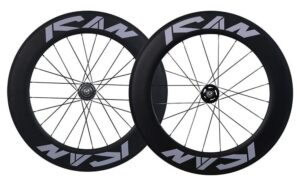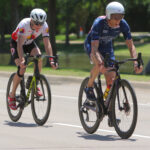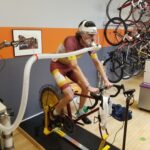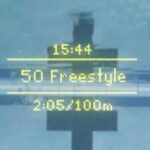You might think that a sport psychologist wouldn’t be interested in technology or hard data. Aren’t we supposed to be into mind stuff like thoughts and emotion? Well yes, psychology is very much about the psyche. At the same time, you may not realize that the data that comes out of a modern endurance-sport watch has a profound impact on how athletes think and feel about their training and competitive efforts. I should know because, in addition to my being a sport psychologist, I’m also a committed triathlete who currently holds a USAT ranking of 22th in my age group in triathlon and 10th in Aquabike. So, I know professionally and personally how the power of data that comes from a good training watch can fuel endurance athletes psychologically as well as physically.
 Before I get into the psychology of endurance-sport technology, let me briefly share which watch I bought and why. When I returned to triathlon 2019 after an 11-year hiatus, I felt the need to upgrade my watch from my old-school Timex Ironman watch to a new-school smart sports watch. I’m a guy who does my research when I invest in something, so I looked at all the top brands including Garmin, Suunto, Polar, and Wahoo. Given its prominence, not surprisingly, I was headed toward a Garmin when I came across COROS. I read a lot of reviews and chose the COROS Apex for several reasons. First, it was very feature rich, with everything I needed for my triathlon training. Second, it only had two buttons, compared to the five buttons found on every other training watch. Third, the COROS Apex came in a 42mm which fit me perfectly (I didn’t want to wear a hockey puck on my wrist!). Finally, the COROS Apex was $200 less than the comparable Garmin 945. (Disclaimer: I bought my COROS Apex retail and endorse it because I believe that it is a superior product that deserves serious consideration when shopping for a smart training watch).
Before I get into the psychology of endurance-sport technology, let me briefly share which watch I bought and why. When I returned to triathlon 2019 after an 11-year hiatus, I felt the need to upgrade my watch from my old-school Timex Ironman watch to a new-school smart sports watch. I’m a guy who does my research when I invest in something, so I looked at all the top brands including Garmin, Suunto, Polar, and Wahoo. Given its prominence, not surprisingly, I was headed toward a Garmin when I came across COROS. I read a lot of reviews and chose the COROS Apex for several reasons. First, it was very feature rich, with everything I needed for my triathlon training. Second, it only had two buttons, compared to the five buttons found on every other training watch. Third, the COROS Apex came in a 42mm which fit me perfectly (I didn’t want to wear a hockey puck on my wrist!). Finally, the COROS Apex was $200 less than the comparable Garmin 945. (Disclaimer: I bought my COROS Apex retail and endorse it because I believe that it is a superior product that deserves serious consideration when shopping for a smart training watch).
Now to the fun stuff!
There are three mental areas in which training watch technology can help you the most as you pursue your sports goals: motivation, focus, and confidence.
Motivation
Motivation is the foundation of everything in your athletic life because without motivation you won’t devote the necessary effort, energy, and time to achieve your goals. The chances are that, if you’re reading this article, you are, overall, a motivated athlete. But there is a big difference between being generally motivated in your sport and getting and staying motivated moment-to-moment in your training. For example, you may be motivated, but it’s still tough to get up for those 5:30 am master’s swims or go for a repeat workout on the track after work. And, getting even more granular, continuing to push hard in the face of 10×2-minute intervals on your indoor trainer at VO2 max can be a real challenge.
example, you may be motivated, but it’s still tough to get up for those 5:30 am master’s swims or go for a repeat workout on the track after work. And, getting even more granular, continuing to push hard in the face of 10×2-minute intervals on your indoor trainer at VO2 max can be a real challenge.
It is in these tough motivational moments that my COROS Apex shines. We humans love goals. There is immense satisfaction to be had in setting, striving for, and achieving goals we set for ourselves that hold deep meaning for us. Plus, it’s motivating to know that you’re being supported by others (even a watch!). So, when I’ve load a tough workout from TraininPeaks onto my COROS Apex, not only do I have my goals for the workout with me every step of the way, but I feel as if I’m not alone in my “place of pain.”
 My COROS Apex motivates me in several ways during a challenging workout. First, when a new interval starts, I know exactly what my goal is, whether pace, power, or heart rate zone. Second, the “I’m in my zone” or “I need to pick it up a bit” vibrations and tones tell me whether I’m on my pace or I need to go harder. Third, I’m sure you can totally relate to the feeling I get after a workout, download my workout data off of my COROS Apex, and see that I hit my numbers; pride, inspiration, and excitement are just a few of the emotions I experience that further fuel my determination to pursue my goals.
My COROS Apex motivates me in several ways during a challenging workout. First, when a new interval starts, I know exactly what my goal is, whether pace, power, or heart rate zone. Second, the “I’m in my zone” or “I need to pick it up a bit” vibrations and tones tell me whether I’m on my pace or I need to go harder. Third, I’m sure you can totally relate to the feeling I get after a workout, download my workout data off of my COROS Apex, and see that I hit my numbers; pride, inspiration, and excitement are just a few of the emotions I experience that further fuel my determination to pursue my goals.
I get similar motivational benefits in my triathlon and Aquabike races where my COROS Apex tells me how I’m doing relative to my race goals. The data I get during a race helps me make adjustments based on those goals as well as how I’m feeling in any given moment.
Focus
One of the biggest difficulties all endurance-sport athletes face is staying focused during training (and races) when the “pain monster” comes calling. As the workout progresses, the roar of the pain monster gets increasingly louder until it’s really difficult to ignore. Sadly, when focus shifts from your training efforts to the pain you are experiencing, you will likely slow down or stop. This is another place where my COROS Apex comes to the rescue. The real-time data it provides me, both visually and with the vibrations and tones, constantly draws my mind away from the pain and onto my effort and my goals. In doing so, I engage a different part of my brain that helps me get through painful workouts. Let me explain.
Our limbic system is involved in ensuring our survival. When it perceives that our life is in danger, it sends signals to our brain in the form of pain (and emotions such as fear and anger) to get away from the threat to our life. This reaction worked very well 250,000 years ago on the Serengeti when we first officially became homo sapiens. Unfortunately, that same primitive reaction prevents us from getting the most out of our training and race efforts in modern-day endurance sports.
What my COROS Apex data enables me to do is to disconnect my effort from my limbic system and engage my pre-frontal cortex (PFC). The PFC is the rational, thinking part of our brain. It enables us to use data we gather and make deliberate decisions on how we want to perceive, interpret, and respond to the messages we get from our body (such as pain messages). Whenever I look at my COROS Apex and process the data it is providing me, I feel less pain, the pain I do feel is less intense, and I’m able to experience the pain positively.
 How does this work? First, by looking at my watch, I take my mind off my pain. This simple distraction makes us less sensitive to the pain we feel. Second, because my limbic system is no longer going crazy warning me of imminent death, the pain I feel isn’t as severe. Third, with my PFC activated, thus enabling me to respond rationally rather than emotionally, I can use the pain I feel to make adjustments, depending on the event, in my pace, body position, stride, cadence, and more, that reduce my pain. Fourth, with my PFC firing on all cylinders, I feel more in control psychologically and physically, a perception that is absolutely vital to maintain when my body begins to rebel against the demands I place on it. This perceived control then enables me to more easily push through the pain and get the most out of my training efforts. Finally, all these benefits of having my COROS Apex on my wrist is that I’m able to connect positive emotions, such as pride and inspiration, to my pain because I know I’m getting stronger and faster. And those emotions make the pain more palatable.
How does this work? First, by looking at my watch, I take my mind off my pain. This simple distraction makes us less sensitive to the pain we feel. Second, because my limbic system is no longer going crazy warning me of imminent death, the pain I feel isn’t as severe. Third, with my PFC activated, thus enabling me to respond rationally rather than emotionally, I can use the pain I feel to make adjustments, depending on the event, in my pace, body position, stride, cadence, and more, that reduce my pain. Fourth, with my PFC firing on all cylinders, I feel more in control psychologically and physically, a perception that is absolutely vital to maintain when my body begins to rebel against the demands I place on it. This perceived control then enables me to more easily push through the pain and get the most out of my training efforts. Finally, all these benefits of having my COROS Apex on my wrist is that I’m able to connect positive emotions, such as pride and inspiration, to my pain because I know I’m getting stronger and faster. And those emotions make the pain more palatable.
Confidence
The psychological end game of my use of the data from my COROS Apex is that I have much more confidence in my training program, my ability to push myself in my workouts, and my belief that I can achieve my competitive goals. Why? Because I see my efforts quantified every day in training and I see my improvements in my fitness and my times. As a sport psychologist, I will tell you that confidence is the most important mental factor because you may have all the fitness, technique, and gear in the world to achieve your goals, but if you don’t believe you possess those assets, you won’t use them to their fullest capabilities.
Every day, in every aspect of my training (e.g., swim, bike, run, conditioning, recovery) and my life (e.g., sleep, nutrition), my COROS Apex enables me to make deposits in my “confidence bank,” the goal of which is to make a big withdrawal on race day. Not surprisingly, my COROS Apex has become an integral part of both my physical and mental training that has a powerful impact on my daily training efforts and my race-day preparations and performances.
 So, if you want to be the best endurance-sport athlete you can be, you need to leverage all that technology has to offer. And, if you’re in the market for a watch to support and encourage your efforts, I would recommend the COROS Apex.
So, if you want to be the best endurance-sport athlete you can be, you need to leverage all that technology has to offer. And, if you’re in the market for a watch to support and encourage your efforts, I would recommend the COROS Apex.
Note: Featured image photo used with permission, John Price x COROS







